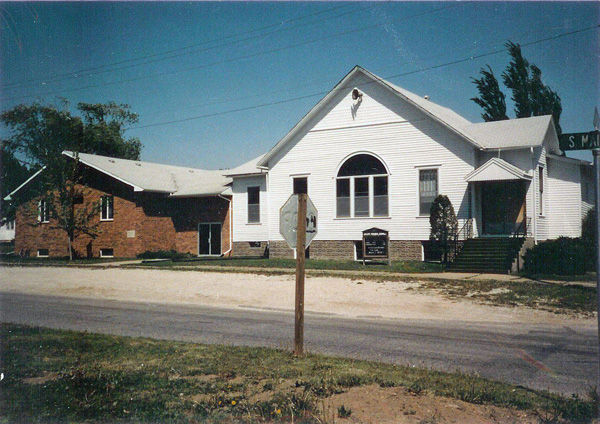|
During the summer of 1835, Aaron Street Sr. and
his daughter arrived on horseback from the Fort Madison ferry. Aaron
Street is quoted as saying “Now have mine eyes beheld a country teeming
with every good thing. Hither will I come with my flocks and my herds,
with my children and my children’s children and our city shall be called
Salem, for thus was the city of our fathers, even near unto the sea
coast.” He soon met up with Isaac Pidgeon who also had just arrived and
they decided together to form a Quaker community. Aaron Street’s Sr. and
Jr. and Isaac Pidgeon laid out Salem, with the help of Peter Boyer. Due
to the lack of a surveyor’s chain they used a grape vine for a measuring
rod, cutting notches in it for the desired widths of the streets and
alleys.
About the middle of the eighth month 1837, a conference of Friends was
held at the house of Isaac Pidgeon concerning holding religious
meetings. The first meeting held was in the home of Henry W. Joy, in the
fall of 1837. “Salem Monthly Meeting of Friends was first opened and
held in Salem, Henry County, Iowa Territory on the 8th day of the 10th
month of 1838.” It was the first Monthly Meeting of the Society of
Friends west of the Mississippi.
As most Quakers were Abolitionists they established stations where
runaway slaves were to be secreted until the “Underground Railroad”
could forward them to Canada. One such station is the Lewelling stone
house, one block south, of this building. It is open for tours on Sunday
afternoons and by appointments.
As the Quakers moved across the United States they did three things:
built a place to worship, started a school and developed a burying
ground. They did all three soon after they arrived in Salem. In May 1839
they began building a hewed log meetinghouse with two rooms each 22 feet
square, at the cost of $340. In 1846 they outgrew that building and they
erected a brick, 35 x 70 foot meetinghouse with two stories, for a cost
of $3,000. The top floor was their school. In 1874 this building was
turned over to Whittier College and a frame structure, 46 x 56 feet and
one story high was completed at a cost of $2,500 dollars. In 1912 the
wood portion of our present church was build, after the older church had
burned on February 5, 1912. The brick addition was added in 1979.
The first meeting set off from Salem was Cedar Creek, in January 1841.
Others soon followed. As you ride north out of Salem and you have
traveled about three miles; look left (west) down a dirt road and you
will see Cedar Creek Meetinghouse. Salem started Grace Community Friends
in Mt. Pleasant, Iowa, which became a monthly meeting in August 2006.
As many confuse Quakers (Society of Friends) with Shakers and Amish let
me assure you they are not the same. The history of Friends goes back
more than three centuries to the mid 1600s, to the founder of the
Society of Friends, George Fox of England. From his words, “I found
Peace when I heard a voice which said, There is one even Christ Jesus
that can speak to thy condition. When I heard it my heart did leap for
joy.”
“We believe in God the creator of all things and in Jesus Christ His
beloved; and only begotten Son in whom we have redemption through the
blood, even the forgiveness of sins, for which that he was crucified for
us, rose the third day, and he ascended into heaven, and now sitteth at
the right hand of God.”
Iowa Quakers maintain a church camp, called Quaker Heights, near Eldora,
Iowa, where children and youth attend and while having fun learn about
God. Many accept Christ as their Savior, thus starting out on their
adventure as a new Christian. What does this mean? It means that you
acknowledge you are a sinner and you confess your sin(s) and ask Jesus
to come into your life and to cleanse you of all your sins and you
believe that Jesus death on the cross covered your sins and that Jesus
will lead you in your Christian walk.
At Salem we have a pastor and our services are quite similar to other
evangelical churches but we do not baptize with water or have communion
with bread and wine. We believe we each can commune directly with God
and thus have a “quiet time” included in our service allowing each
person to commune with God. We believe that Jesus requires us to be
baptized with the Holy Spirit and by thus doing, will allow God to
control our lives. No need for the actual water. John the Baptist said,
(Matthew 3: 11) "I baptize you with
water for repentance. But after me will come one who is more powerful
than I, whose sandals I am not fit to carry. He will baptize you with
the Holy Spirit and with fire." NIV
|


